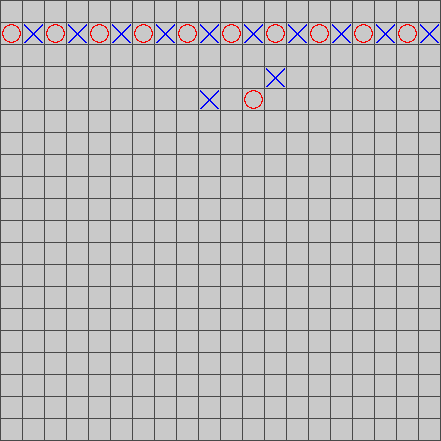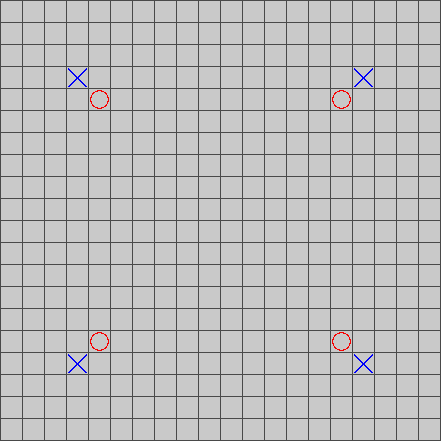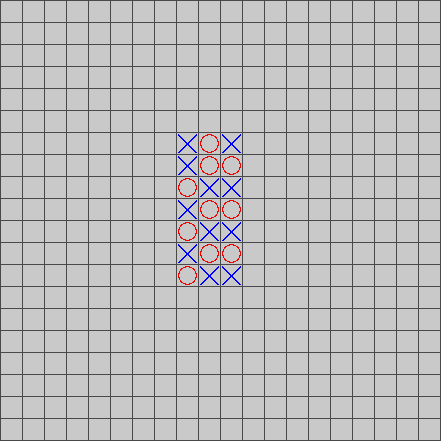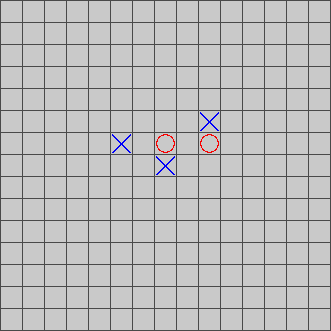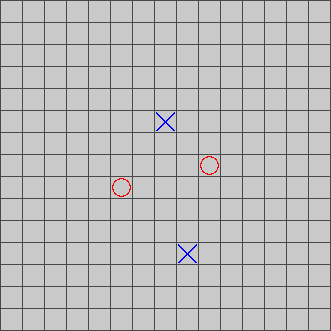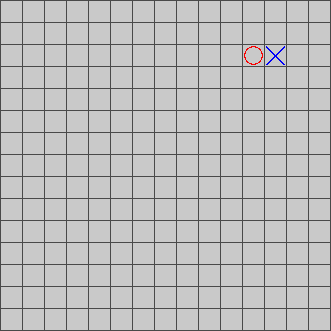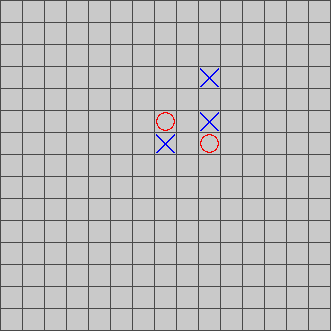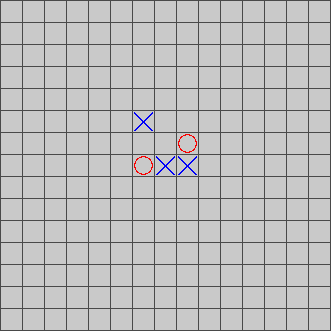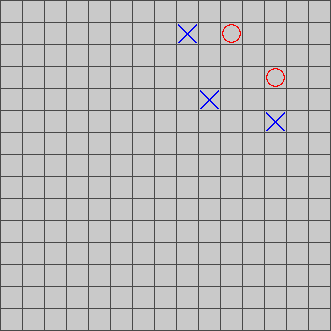Gomocup 2021, the 22nd tournament (May 14th-16th, 2021)
The Gomocup 2021 took place on May the 14th-16th, sponsored by Tech Center of Lightspeed & Quantum Studios Group, Tencent.
There were five cloud servers and one workstation available whose configurations were as follows:
- Tencent Cloud Server S5.8XLARGE64 (Windows Server 2016, x64 32 vCPU (Intel Xeon Cascade Lake 8255C, 2.5/3.1 GHz), 64GB RAM)
- Tencent Cloud Server S5.8XLARGE64 (Windows Server 2016, x64 32 vCPU (Intel Xeon Cascade Lake 8255C, 2.5/3.1 GHz), 64GB RAM)
- Tencent Cloud Server S5.8XLARGE64 (Windows Server 2016, x64 32 vCPU (Intel Xeon Cascade Lake 8255C, 2.5/3.1 GHz), 64GB RAM)
- Tencent Cloud Server S5.8XLARGE64 (Windows Server 2016, x64 32 vCPU (Intel Xeon Cascade Lake 8255C, 2.5/3.1 GHz), 64GB RAM)
- Tencent Cloud Server S5.16XLARGE256 (Windows Server 2016, x64 64 vCPU (Intel Xeon Cascade Lake 8255C, 2.5/3.1 GHz), 256GB RAM)
- Windows 10, x64 Dual Intel Xeon E5-2695 v2 (2.4/3.2 GHz), 64GB RAM
The openings for Gomocup 2021 were chosen by the following people (sorted alphabetically according to last names):
- Alexander Bogatirev - Gomoku player, member of Gomoku Committee RIF, member of organizers committee of Russian Gomoku Championship, winner of Russian Gomoku Cup 2016.
- Tomoharu Nakayama - Japanese renju player, 8dan. He got the 7th place in the 15th World Renju Championship, and won the Japanese Meijinsen in 2017.
- Aivo Oll - Renju player, 7 dan, former Estonian champion, European champion, and world youth champion.
- Zijun Shu - Gomoku player and AI researcher, contributor of several Gomoku AIs.
- Tao Tao - Renju theory researcher, who published some researches and new designs of renju openings, participated in promotion of Renju and translated several Japanese renju books.
- Qichao Wang - Renju expert, 4 dan, who has done a lot of researches in renju openings, and won the World Correspondence Renju Championship 2019.
Thank you all!
Same as last year, we prepared 12 openings for every rule.
- Openings for the freestyle league:
- Openings for the standard league:
- Openings for the renju league:
What is new?
- Updates
- AlphaGomoku (Kozarzewski) 2021 - New training run of about 1 million games; included VCF solver in the search algorithm.
- Ego 2021 - Bug fixed.
- Embryo 2021 - Fixed wrong forbidden points classification in Renju; fixed swap logic; some speedup.
- Katagomo 2021 - Rewritten based on a new Katago version, so it has a CPU-only version now and will participate in all the classical leagues as well; added a strict VCF solver; new nets with VCF feature input.
- PentaZen 2021 - Searching and evaluation are optimized; support SWAP-2, multithreading, and some Yixin-Board commands.
- PureGM 2021 - MCTS algorithm guided by a trained ANN.
- Rapfi 2021 - Support for standard and renju rule is added; serveral bugs are fixed and some modification is made on evaluation; basic support for Yixin-Board is added.
- XoXo 2021 - Improved threat detection; auto tuning.
- New AIs
- Barbakan - a Gomoku program developed by Janos Wolosz and contributors of Katago. To determine the best moves Barbakan is combining two kinds of searches: a relatively slow Monte Carlo search with NN evaluation and a fast surewin search on the search leaves. The Monte Carlo search and the NN training pipeline of Barbakan is based on go program KataGo. Barbakan supports freestyle rule.
- Other Changes
- Due to high crash rate of TIANSHU and BENJAMIN, they are removed from Gomocup this year.
There were 2 freestyle groups (i.e., Freestyle 1 and 2), 1 fastgame group (Fastgame), 2 standard groups (i.e., Standard 1 and 2), and 1 renju group (Renju) in Gomocup 2021. Elo rating system was used to evaluate AIs' strength. AIs were divided into different freestyle and standard groups according to the placement in the last tournament. For Freestyle 2 and Standard 2, the top 4 AIs were moved up to the next group (i.e., Freestyle 1 and Standard 1, respectively). If the top k (k>4) places were all taken by new (or updated) AIs in a group, then all these k AIs would advance to the next group.
Memory limit/time per move/per match were determined to be same as Gomocup 2020:
| TOURNAMENT | TIME LIMIT PER MOVE [S] | TIME LIMIT PER MATCH [S] | MEMORY LIMIT [MB] | BOARD SIZE | RULE FOR WIN |
|---|---|---|---|---|---|
| Freestyle 1 league | 300 | 1000 | 350 | 20 | five or more stones |
| Freestyle 2 league | 30 | 180 | 350 | 20 | five or more stones |
| Fastgame | 5 | 120 | 350 | 20 | five or more stones |
| Standard 1 league | 300 | 1000 | 350 | 15 | exactly five stones |
| Standard 2 league | 30 | 180 | 350 | 15 | exactly five stones |
| Renju | 300 | 1000 | 350 | 15 | renju rule |
In addition, there was an experimental tournament following Gomocup 2020, where AIs were running on participants' computers. This experimental tournament had no limitation on AI size and allowed participants to use any hardware (e.g., GPUs) that they had access to. Time per match was 90 min. There was no additional time limitation per move. Following Gomoku World Championships, the rule for this tournament was Swap2. The tournament was a double round-robin tournament and tie-break criteria were: game points; match points; Berger coefficient; personal score, following World Correspondence Gomoku Championships.
As the tournament grows larger, this year we started to employ a new mechanism to speed up Fastgame, Freestyle 2, and Standard 2. Specifically, while we still matched each brand new/updated AI with all AIs, for old AIs, we only matched every pair of them whose last year's Elo difference was no more than 400.
There were technical difficulties like every year.
- In the beginning, we had trouble running JUDE. We figured out that the problem was caused by the fact that the maximum INFO folder path length JUDE could process is shorter than MAX_PATH. We resolved the issue by switching to a shorter path.
- There was a bug in the client for the experimental league. We fixed the bug and restart the influenced games.
The brand new BARBAKAN, updated KATAGOMO, RENJUSOLVER, and WHOSE were the top 4 in the freestyle 2 league and advanced to freestyle 1.
While the updated EMBRYO remained to be the winner of the freestyle 1 league this year, the brand new BARBAKAN outperformed the updated RAPFI and took the second position. The performance of the updated RAPFI and the updated KATAGOMO was very close and they finally reached the same Elo and were both ranked 3-4th.
The winner of the fastgame league was EMBRYO. The second place was taken by BARBAKAN, and the third by RAPFI.
We have been seeing an increasing number of AIs that support the standard rule, and this year we have more than one standard group for the first time. KATAGOMO, RAPFI, HEWER, and SLOWRENJU were the top 4 in the standard 2 league and advanced to standard 1.
The winner of the standard 1 league was KATAGOMO. The second place was taken by RAPFI, and the third by EMBRYO.
The winner of the renju league was KATAGOMO. EMBRYO took the second place. The third was RAPFI.
Five AIs participated in the experimental league. The winner of this league was KATAGOMO. ALPHAGOMOKU (Kozarzewski) took the second place. The third was PENTAZEN.
You can download complete results and openings here.





